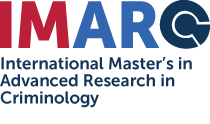Midterm conference of the Working group ‘Immigration, Crime and Citizenship’ of the European Society of Criminology.
22-23 March 2023 – Erasmus University Rotterdam
Call for papers:
In recent decades, we have observed a proliferation of borders and bordering practices around the world. This phenomenon has brought about a vivid and flourishing criminology of mobility scholarship, i.e. the academic discipline consisting of legal and social scientific scholars who discuss migration phenomena, bordering practices, citizenship matters, the criminalization of migration, and others. This scholarship continues to grow as observed proliferation, securitization and crimmigration trends pose new academic challenges, especially in light of recent developments with the influx and rather welcoming practices for Ukrainian war refugees vis-à-vis the European reception crisis.
Over the years, more and more scholars from different academic disciplines, geographical locations and research traditions have been studying Migration, Citizenship and Crime issues in different European countries. These scholars consider the geographical, legal, political and social peculiarities of their contexts as well as the epistemological perspectives of their academic disciplines. However, an adequate understanding of developments in the migration, crime and citizenship domain requires scholars with different backgrounds to collaborate and share their insights with each other. Such discussions and collaborations enrich empirical findings and theoretical discussions on these topics. This conference, therefore, aims to unite Migration, Crime and Citizenship scholars from different disciplines, geographical locations and research traditions across Europe to contribute to the criminology of mobility.
The conference specifically invites empirical legal studies on Migration, Crime and Citizenship issues. The voices of those involved in these issues are still underrepresented in academic research, which comes at the expense of knowledge on the functioning of bordering practices in social reality, the (behavioral) assumptions underlying restrictive bordering practices, its impact on those involved in these practices as well as its consequences for society. Empirical studies may fill these gaps in the scholarship of mobility. These studies do bring methodological challenges though, which may encompass gaining access to the research field, working with highly vulnerable populations from different cultures and languages, conducting research across borders and in several countries, etc. The conference aims to stimulate scholars to present empirical contributions as well as reflections on methodological challenges to further stimulate multidisciplinary approaches in this field.
In so doing, the conference will try to build bridges between insights and scholars in the migration domain to broaden the understanding of the Migration, Crime and Citizenship scholarship. It hopes to reinforce the ESC Working Group on Immigration, Crime and Citizenship as a collaboration network for criminologists, socio-legal scholars and social scientists from different backgrounds conducting research in this field. We invite scholars to submit an abstract on a wide range of issues encompassed by the broad topic of Migration, Crime and Citizenship, including:
• Epistemologies and methodologies to research Migration, Crime and Citizenship.
• Empirical legal studies on Migration, Crime and Citizenship.
• Immigration control.
• Borders and border security.
• Asylum, migration and fundamental rights.
• Asylum, migration and gender.
• Politics of immigration, crime and deviance.
• Asylum, migration and victimisation.
• The intersection of immigration law and criminal law (‘Crimmigration’).
• The responsibilization/outsourcing of immigration control.
• Humanitarization and other legitimizing discourses of migration control, asylum and border management.
• Imprisonment and immigration detention.
• Citizenship and criminal justice.
• Human trafficking and smuggling of migrants.
• Terrorism and securitisation.
• Policing and migration.
• Racism, xenophobia and hate crimes.
• Criminalization of migration and asylum.
• Digital technologies and AI related to border control, migration or asylum.
• Gender, race, and (post/neo)colonialism related to border control, asylum and immigration management.
• Agency, resistance and solidarity practices related in the migration/asylum context.
Organising committee
• M.H. (Mieke) Kox – Erasmus University Rotterdam (the Netherlands)
• Prof. dr. Witold Klaus – Polish Academy of Sciences (Poland)
• Dr. Cristina Fernandez – Bessa – University of A Coruña (Spain)
• Prof. Valeria Ferraris – Universita di Torina (Italy)
Abstract guidelines
When submitting your abstract, please have in mind the following:
• Abstracts should be sent through the online form: https://www.eur.nl/en/esl/events/migration-crime-and-citizenship-interdisciplinary-and-multi-sited-research-approaches-2023-03-22
• Abstracts may not exceed 250 words. It should include a title, description of the presentation including the methodology, up to 4 keywords, the author’s affiliation as well as contact details.
• Pre-arranged panels of three or four presentations will be accepted and can be submitted using the online form. Please add the name of the panel and the names and abstracts of its participants.
• A person can submit only an abstract as single or main author (no one will be able to present two papers as panels will run in parallel).
• We will notify you about acceptance of your abstracts on 15 January 2023.
• We expect contributors to attend the conference in person in Rotterdam.
• Any questions? Please contact us: wg.immigrationcc@vascolubgmail-com
Key Dates
• Deadline for abstract submission: 16 December 2022
• Decision on the acceptance of the abstracts and preliminary program: 15 January 2023
• Conference date: 22-23 March 2023, with an opportunity for a social program on 24 March (e.g. visit to an immigration detention center, seaport police Rotterdam, shelter/groups for unauthorized migrants, etc. TBA)
Bursary opportunities
• Early career researchers without funding can apply for a travel bursary covering some travel and/or accommodation costs by sending a motivation letter and narrative CV to wg.immigrationcc@gmail.com before 16 December 2022.
This event is supported by the small grants scheme of the research initiative on Rebalancing Public & Private Interests and Erasmus Center of Empirical Legal Studies of Erasmus School of Law and the sector plan for law funding of the Ministry of Education, Culture and Research.



